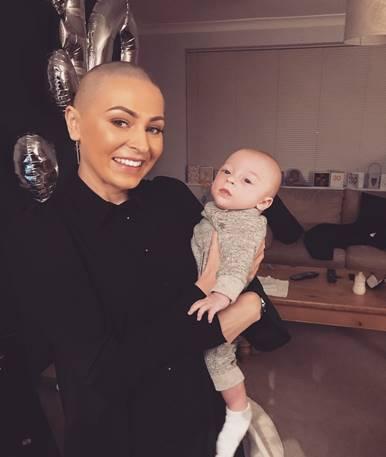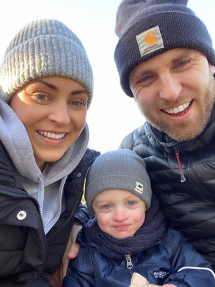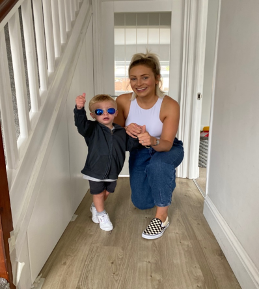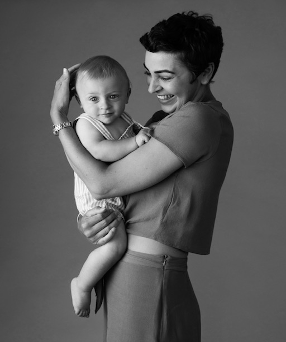Over halfway through her pregnancy, Sophie was given the shocking news that she had leukaemia. Clare, from our Patient Services team, spoke to her about her experience, from diagnosis to what helped her on the tough road to recovery after a stem cell transplant.
You were six months pregnant with your son, Freddie, when you were diagnosed with T-cell acute lymphoblastic leukaemia (ALL). How did it feel to be given that news?
Yeah, very shocking. It was the last thing I expected.
I’d felt very unwell for at least six months and just put it down to being pregnant. It was my first pregnancy, so I had nothing to compare it to. I saw my GP and he said my heartrate was ridiculously fast, so I went to the hospital where they said I needed to stay overnight.
Whilst my husband had gone home to get my clothes, the doctors came round and told me it was cancer. I was just really taken aback. I didn’t really cry, I just sat there in shock.
Luckily my husband came back within ten minutes of them telling me. That’s when I burst into tears. How could this happen? I was pregnant.
I spent two months in the hospital from then. That was so surreal, and my life changed from that day on.
What did your treatment plan look like?
The neonatal doctors would meet with the haematologists frequently to discuss what to do. I think I was a bit of an anomaly.
They immediately put me on a course of steroids to try and shrink the lymphoblastic cells on my chest. I actually underwent two rounds of chemo with Freddie inside of me. I remember thinking, ‘we need to keep this baby alive’.
The doctors were absolutely amazing. They had experience of giving chemo to pregnant women which meant that they gave me specific drugs with certain molecules so the chemotherapy would not pass the placenta.
When they realised that they needed to give me more of an intense round of chemo, that’s when it was decided that Freddie would have to come early.
How did that feel to be told that Freddie had to be born premature?
I really wasn’t keen on this. I wanted to keep him inside me for as long as possible for his development. I really wanted to give birth naturally too, but it was safer to do a C-section.
He was born at 32 weeks. It was the best, but also the worst day of my life. My husband and I were absolutely terrified. But it all went really well and he was born with no complications. They took him away from me immediately to go to neonatal intensive care unit (N-ICU) to be cared for, so that was pretty strange. That’s where he stayed until his due date.
How were you doing after his birth?
I went back to my haematology ward and continued to have some more chemotherapy. I was just in the zone.
My husband and I tried our best to hold it together and just listen to the doctors, to do what was needed to keep going. I kept breaking it down to one massive milestone at a time to cope with it all.
At what point did you get told about your bone marrow transplant, and did you know what it would involve?
They decided early on that my best course of treatment wouldn’t be just chemotherapy and I needed a bone marrow transplant.
I had a long meeting about the transplant and, to be honest, it was pretty terrifying knowing all of the risks. But I knew that was my best way to recover from ALL.
I remember thinking, ’if this bone marrow transplant fixes me, then I’m done’. It was probably really, really silly of me to think like that because the transplant was about the toughest thing to ever recover from.
How was the bone marrow transplant for you?
The transplant itself is really easy.
It’s the aftermath which was probably the hardest bit of my whole process. I just felt truly awful. I was only in hospital, in isolation, for four weeks. I think the doctors thought I’d recovered from that relatively well. But I just didn’t know what was in store for me when I got home.
I thought, once I get out of hospital and I can eat my own food and be in the comfort of my own home, I’ll feel so much better. But it didn’t get better and I couldn’t eat, I felt terrible. I had to crawl up the stairs. I lost so much weight. I was weak and I had a new-born baby at home. All I wanted to do was hide under the duvet.
I remember thinking to myself, ‘Soph, you’ve got to get up and you need to look after your baby’. My head felt like it was gonna explode as it was overwhelming. My husband and my family were amazing throughout. My family would sit with me daily because I wasn’t well enough to look after Freddie by myself. That really helped.
When did you start to see your recovery improve?
It took several months until I was starting to feel a little bit better. It was my 30th birthday and I was able to have a meal out as they cleared the restaurant for me.
That was the turning point really of when I could see the light at the end of the tunnel - I was rebuilding some strength. I was worried about picking up any bugs so I stayed away from groups of people for months and just tried to go for fresh air and walks with Freddie and my family.
How was your mental health through all of this? How did you look after yourself?
My mental health took a bit of a dip when I was at home recovering. I was quite strong up until then and I remember thinking, ‘oh, my god, I can’t do this’.
I felt like I had a lot to catch up on in terms of life. I was missing out on doing all the mum things. The hospital put me in touch with a psychologist. I wanted someone to tell me that I was going to be fine and people couldn’t do that. I asked my doctor ‘will I ever feel well again?’. They encouraged me and told me I was doing so well.
What really helped was just getting out and about, a good diet, building my strength up and getting more sleep – that was hard with a new-born baby! I found being on social media hard too, as I didn’t recognise myself in the mirror, but I could see everyone else out living their lives while I was at home, isolated, trying my best to recover.
My family and husband helped me most of all. We just tried to see some improvements, week by week. Seeing Freddie progress and doing really well kept us going too.
A milestone for feeling better was after a year, my bone marrow biopsy results came back all okay. That then gave me the confidence to be, like, ‘right, Soph, you need to start going out and living your life again’.
You are nearly three years post-transplant, how are you doing and how is Freddie?
I feel really good. The doctors are happy with my progress. Life is good at the moment. Touch wood. I do suffer from fatigue at times and notice that, but I am back at the gym and trying to keep fit.
Freddie is a happy, healthy little three-year-old. He’s great. He’s outgrown his heart condition that he was born with as he was so premature. He’s off all medication, has started pre-school and is doing great!
That’s amazing to hear. What advice do you have for someone who’s going through what you’ve gone through?
I would say just put your trust in your doctor and follow all the advice that you’re given. Stick to the rules because that will only aid your recovery.
You have got a lot of time to think when you’re recovering. Take the time to rest and take your mind off things. I did some adult colouring books and lots of walks. That makes your head feel a little bit better.
Also talking to someone about how you feel. I found it helpful to have someone with me when I was given medical updates too, as I found it hard to take it all in. Let people help you. if someone can cook for you, or let you sleep for a while, don’t be too proud. Take the support.



